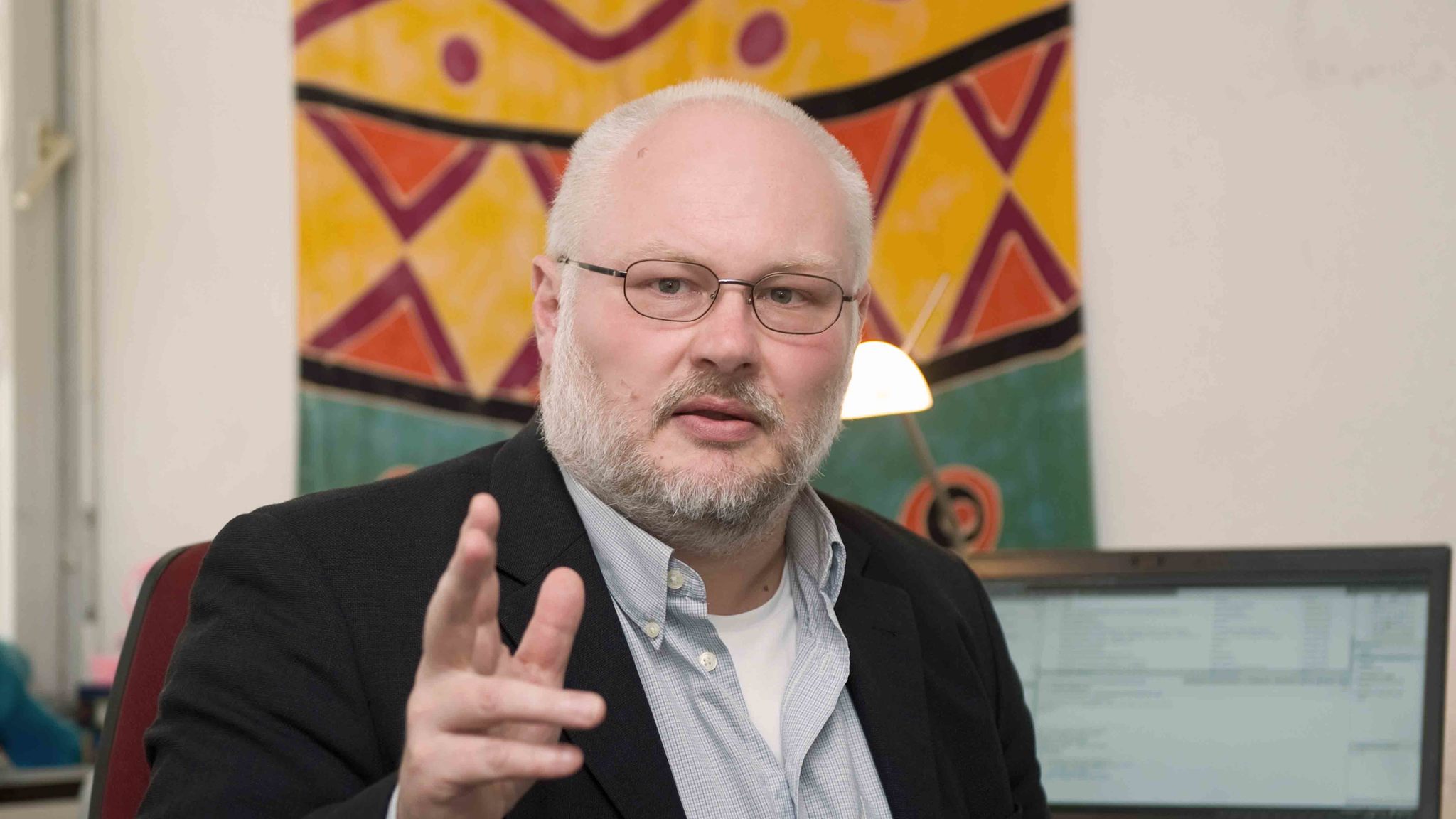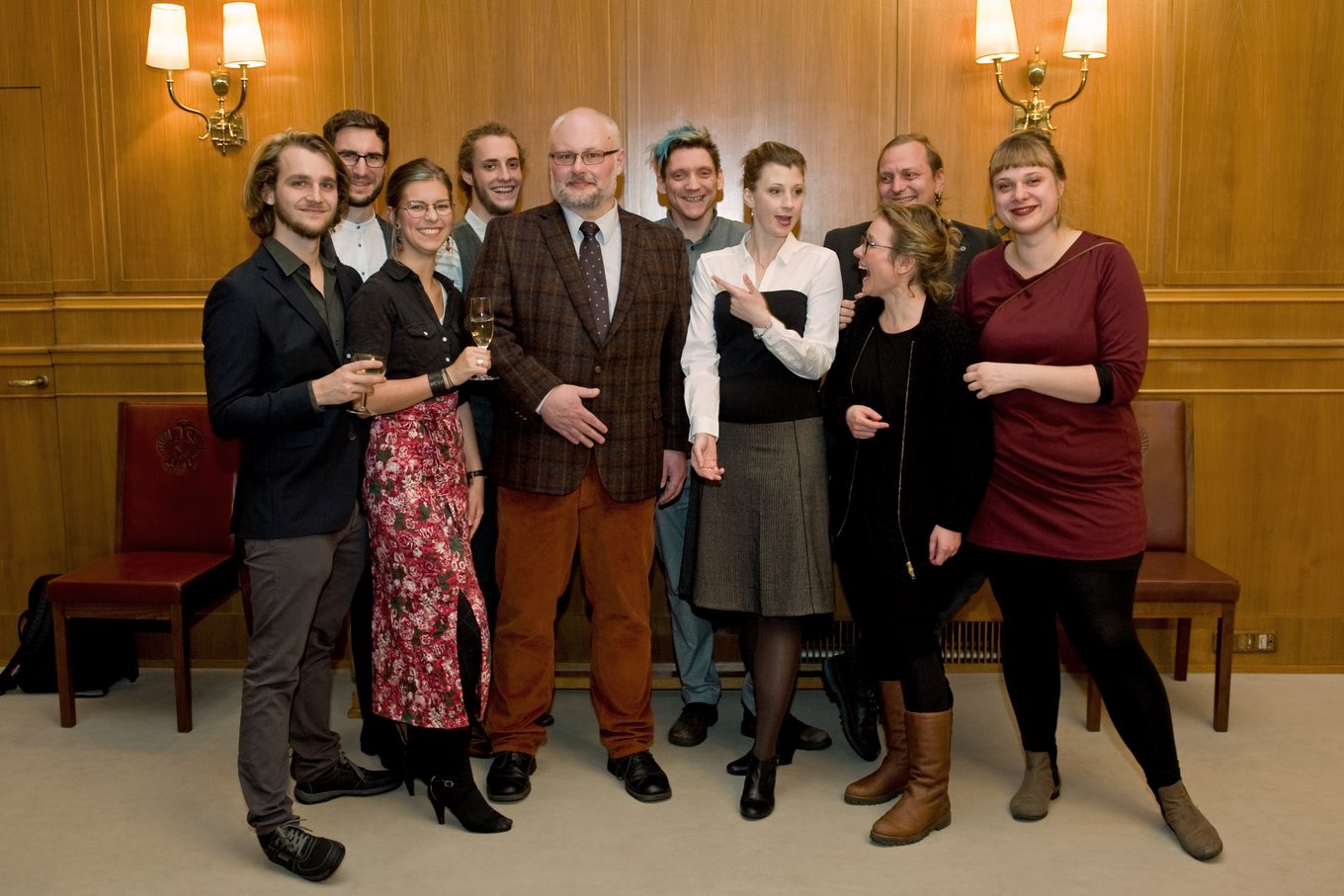
The Ingenious System of Hans-Christian Waldmann
Psychology professor assigns his students task of compiling an electronic dictionary
Nominated by his students, Professor Hans-Christian Waldmann was awarded the Berninghausen Prize for Excellence in Teaching. Since then, the number of students has doubled. He now gives lectures and seminars for 60 young people with up to 18 hours a week each semester. “It’s my calling,” says the professor who calls his subject “theoretical psychology”.
“I’m mercilessly frontal in lectures. In seminars I don’t say anything.”
With his work, he wants to make concepts and terms in psychology from the history of thought understandable in an intercultural comparison. “I’m unbelievably retro in my didactics,” jokes the eloquent academic and says, “I’m actually anti-innovative.” Students are supposed to like this? This poses a few questions. Whilst talking to Professor Waldmann (the room is darkened, there are cuddly toys on the windowsill, maps of the Arctic tundra pinned to the wall), one thing becomes clear: his teaching methods represent an ingenious system. A high technological factor interchanges with analog and, in the good sense, old methods. The psychologist and statistician says he is “mercilessly frontal” in lectures. “In seminars I don’t say anything.”
Pooling Knowledge in WIKI
“What is teaching like today?” asks the 51-year-old rhetorically and answers, “Technocraticized, decoupled from the individual teacher, e-learning, downloads, PowerPoint and e-exams.” He only uses technology at the end of the semester. “I want the academic competence which my students have acquired, everything which we have intensively discussed in the past three months, to come together.” For this, they compile a WIKI, a type of dictionary or textbook, in which the knowledge is jointly entered and processed so it is available for everyone. It is the final product of “a joyous and painful process,” says the psychology professor with a smile.
Top Student Writes 14 Pages
A huge compendium is created with the names and thoughts of significant psychologists and philosophers, gestalt psychology, neuropsychology, social psychology, development psychology, religions, the body-mind problem, natural sciences and technology – everything is intensively examined, described and presented. This basis possibly makes it easier for the future psychologists to pass their exams. For this, Waldmann hands out notes, each with only one or two questions, which the students have three hours to think about. They write down their thoughts and flashes of inspiration on paper, by hand, and it is here that linked thinking helps. “My top students can write 14 pages,” beams the examiner. As he clearly has a good rapport with his people, he is also open to their wishes. “They asked me to also offer a multiple-choice test and I was happy to comply with this.”

Educating Decision-Makers
These are not simply any old games as the method is also connected with the future profession. “I want to educate decision-makers but not those who think they have a monopoly on the truth,” emphasizes Waldmann. Psychology, in particular, has many different methods and schools of thought. Future therapists need a theoretical approach and must dare have their own viewpoint whilst being aware of as many different approaches as possible in order to later look after their patients. And you need to be able to speak to them. PowerPoint can’t help here. He, as lecturer, also needs to be engaged and take a stance. Professor Waldmann loves controversies. They establish the fields of conflict, which characterize his profession. He chooses the word “Überfremdung”, or “over-foreignization”, as an example that he takes apart and conjugates with his students. The subject matter also includes religions.
3,000 Years in One Weekend
So, to sum up: input in lectures, controversies, discussions and networking in seminars, a pooling of knowledge in WIKI followed by the exam question. See above. Some wishes remain unfulfilled, even for Waldmann. He dreams of spending a whole weekend in one go with his students in the lecture hall – discussing and comprehending the history of thought of psychology (literally: teaching of the mind). But security would probably turn up says the innovative teacher, waving his hands.
Hiking Is Like Yoga
Now all he needs to do is explain the cuddly toys and the maps. “If students with children come to me, they like playing in my office. The pink walrus is a favorite and Graf Zahl only has one tooth left.” Waldmann talks openly about his time as a single dad. And the maps on the walls? They refer to his hobby – hiking. However, not just anywhere but alone on the perma-frost soil of the tundra or the endless forests of the Taiga. “I seek sensory deprivation, isolation and look inwards, it’s like yoga.” There’s no doubt about it, the psychology professor is always good for a surprise.
Profile:
Prof. Dr. Hans-Christian Waldmann was born on May 22, 1968, in Mannheim. He studied psychology in Heidelberg between 1988 and 1993 and graduated with a diploma. He became a father for the first time in the sixth semester. After his studies, he worked as a research associate at the University of Mannheim and joined the University of Bremen in 1995 where he did his PhD and then habilitated in 2000. In 2010, he was appointed as a professor and today works at the Department of Psychology. In third-party funded projects, Prof. Dr. Hans-Christian Waldmann develops tests and screening methods for school enrollment, amongst other things.